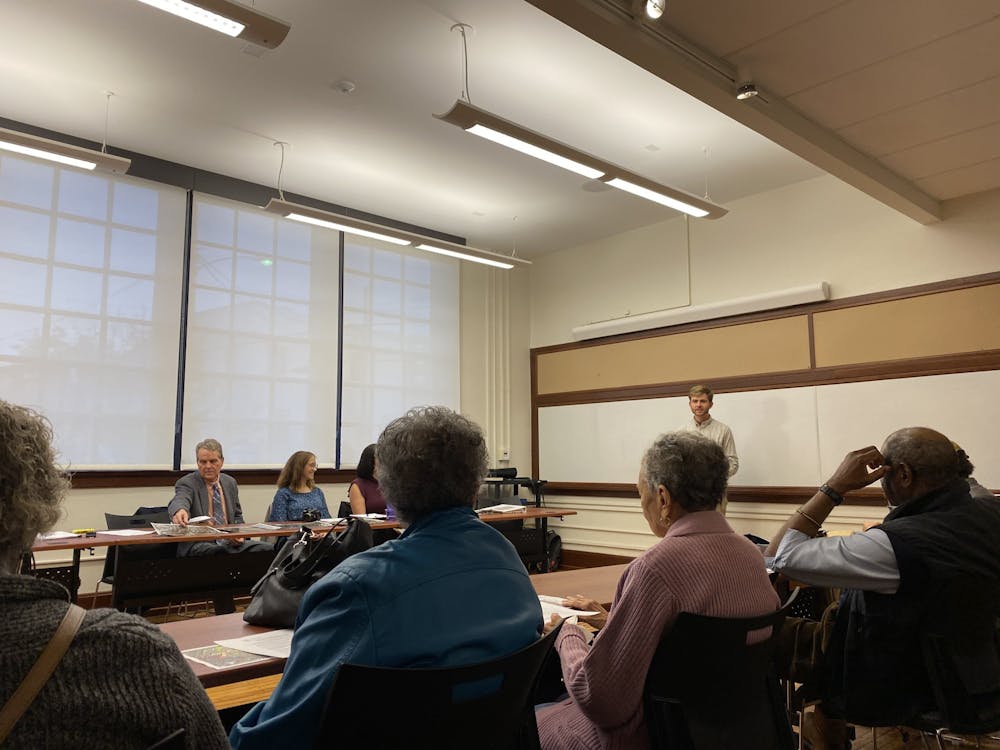The City of Charlottesville had planned to begin a historic survey of the 10th and Page neighborhood last week, but the survey was delayed after a Nov. 6 community meeting held at the Jefferson School African American Heritage Center during which community members present expressed the need for further discussion including more residents.
A historic survey is the first step necessary to potentially pursue formal designation as a historic district at the local, state or federal level. Based upon previous recent historic surveys done in other Charlottesville neighborhoods, the final report would include descriptions of the neighborhood’s physical aspects, architectural styles and quality, along with descriptions of the district’s history and significance.
The survey would be a continuation of an initiative started under Charlottesville’s 2013 comprehensive plan. One of the plan’s goals was to create an inventory of the City’s historical resources, and the plan specifically identified the 10th and Page, Starr Hill and North Belmont neighborhoods as those with which the City should work to develop interest and participation in each neighborhood’s respective documentation.
The City has already completed historic surveys of Starr Hill and North Belmont, but only North Belmont pursued formal historic designation. The North Belmont neighborhood was added to the Virginia Landmarks Register in December 2017.
10th and Page would be the last of the three aforementioned neighborhoods to be surveyed, and the survey would include approximately 350 properties from during or before 1959.
The 10th and Page neighborhood is recognized by University Communications as one of the neighborhood groups bordering the University with which the Office of Community Relations actively works to address issues of mutual interest and concern through regular meetings with neighborhood associations. The neighborhood includes Preston Avenue, Grady Avenue and West Main — streets on which many students reside in off-Grounds housing.
Furthermore, many 10th and Page residents have worked and continue to work at the University, as described in the neighborhood association’s own description and C-Ville Weekly’s 2017 investigation into the neighborhood’s changing culture and gentrification.
The survey had been slated to begin Nov. 7, and two employees of 106 Group — the independent firm hired to conduct the historic survey — were present at the Nov. 6 meeting to introduce themselves to neighborhood residents and explain their process for the survey.
The survey would yield a Preliminary Information Form that would indicate whether the neighborhood would meet the criteria to potentially pursue formal historic designation. While local designation as a historic district would entail certain restrictions to maintain the district’s character, state and federal designations are strictly honorary.
“Only local designation — that is, by the City of Charlottesville — results in any regulatory changes,” said Jeff Werner, the City’s historic preservation and design planner. “And as with the state and national designation, the City will only consider local designation if it is initiated by the people in that neighborhood.”
Werner repeatedly emphasized during the meeting that pursuit of formal historic designation after the survey is entirely dependent upon the neighborhood’s initiation. However, a majority of the 10th and Page residents present expressed feelings of frustration in regards to having been left out of discussions prior to the City’s decision to move forward with the survey.
The City had mailed letters about two weeks ago to notify the neighborhood’s residents about the Nov. 6 community meeting. Multiple residents said that they first learned about plans for the survey to be conducted when they received those letters.
Marc Wagner, senior architectural historian at the Virginia Department of Historic Resources, explained at the meeting that there are some more tangible benefits to the survey despite state or federal historic designation being strictly honorary.
“The one that I think is the greatest is the education benefit — visibility,” Wagner said. “When you designate a neighborhood, and you already have high visibility in Charlottesville, the history is out there.”
He also stated that another benefit would be tax credits or benefits that could be gained for doing rehabilitation work.
“The other reason — and I kind of like this one — is if there is a big state funded or federally funded or permitted project that might impact the neighborhood … our agency gets to review that along with the City,” Wagner said. “We [the Virginia Department of Historic Resources] work with the city on these reviews, and we look at the impact on the historic district and recommend ways to mitigate the damage to the historic district. We are your advocate.”
However, residents present at the meeting continued to question the direct benefits that they specifically — not the City or state — would experience as a result of participating in and allowing the survey.
Residents also expressed concerns about the potential impact the survey and historic designation might have on raising property taxes, but Werner said that property taxes around the City have risen because of other factors separate from historic designation.
Werner emphasized that historical designation could potentially lend greater support in any potential future disputes or conflicts the neighborhood might have.
“It just gives you that extra arrow in the quiver, tool in the toolbox, to say, ‘This is important,’” he said. “That's how I see it — it gives us an avenue to argue changing how some things are being done.”
The projected cost of the survey is $52,560, with funds partially coming from the City and partially being matched by a federal grant. The City has been designated by the Virginia Department of Historical Resources as a Certified Local Government, a status which confers eligibility for federal and state grants that enable more formal participation in state and national historic preservation programs.
The survey has been postponed pending further discussion at another community meeting to be held in the near future.





